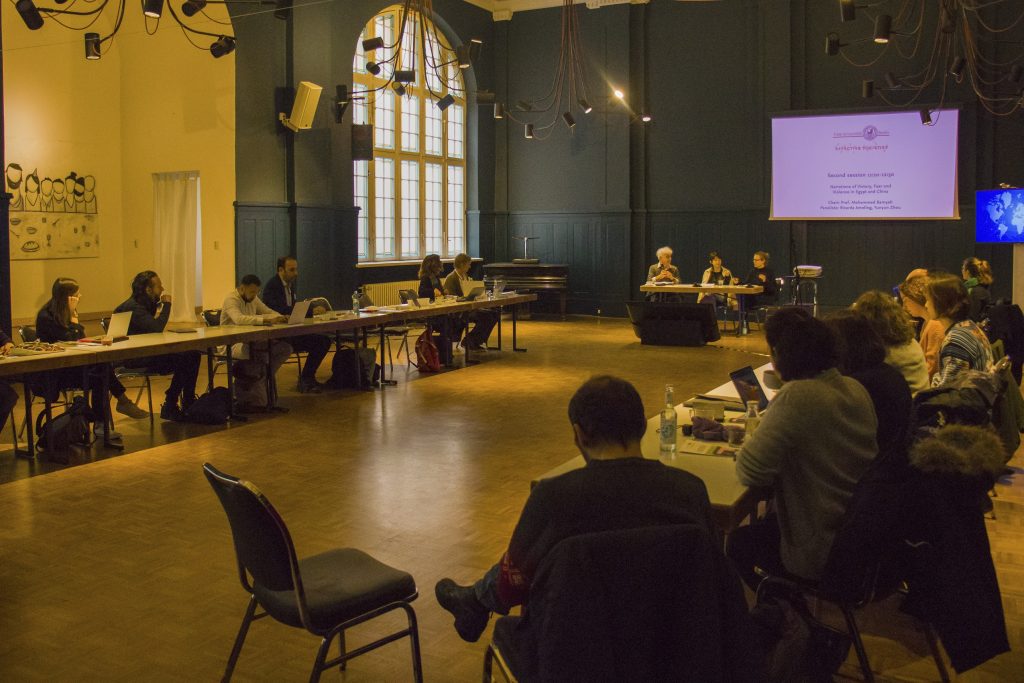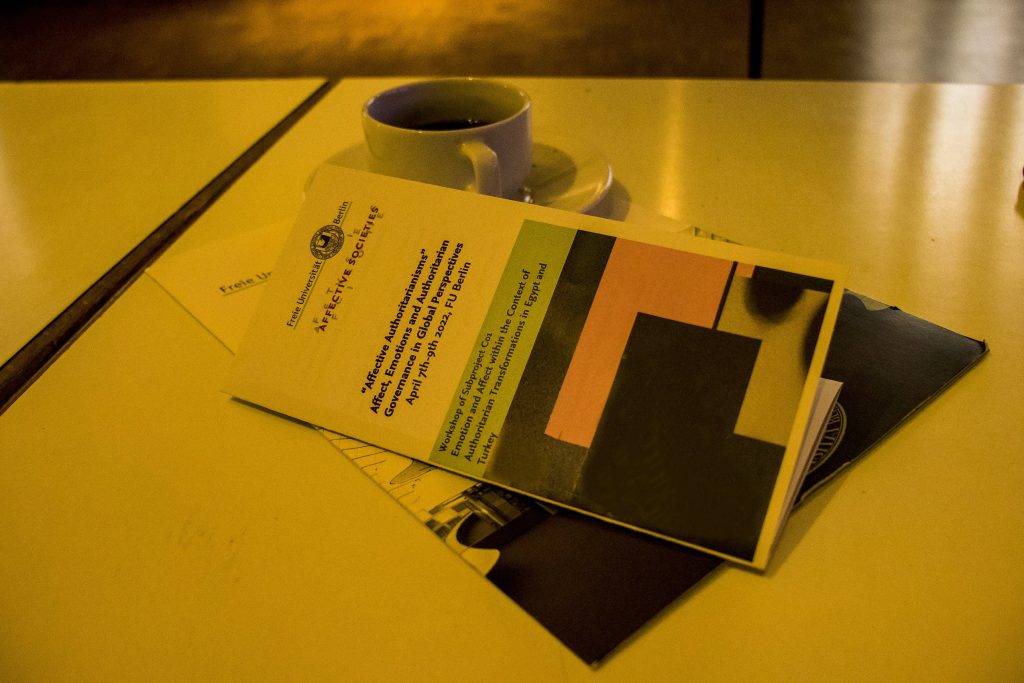Authoritarian and populist leaders have been rising on a global scale for some years now. While Egypt and Turkey slid into dictatorship after considerable public mobilization and revolutionary protests in 2011 and 2013 respectively, seemingly consolidated democracies also experienced substantial political shifts. From India to Hungary, from Russia to Brazil, the number of authoritarian policies, governments and the rise of reactionary right-wing parties is growing. There is abundant literature about the topic, however as Pittel (2018) points out affect and emotions are either ignored completely or are treated as “bad affects”, exemplified by artfully manipulative populist leaders immersed in mindlessly cheering crowds. Although affective politics are used to criticize certain politics like forms of propaganda and populism, they don’t have to be bad at all (ibid.).

The Affective Authoritarianisms workshop, organized by the Project C01 “Emotion and Affect within the Context of Authoritarian Transformations”, addressed this gap and invited scholars working in different countries and fields for an interdisciplinary exchange. The three-day workshop offered a packed program, including a keynote lecture, five panels and a roundtable with activists working on counter-strategies against authoritarian regimes. By combining online and in-person formats, international speakers and guests were hosted to engage in the discussions in Berlin. Participants were Dr. Nermin Allam, Prof. Bilgin Ayata, Ricarda Ameling, Prof. Mohammed Bamyeh, bahar fırat, Prof. Cilja Harders, Prof. Salwa Ismail, Prof. Graeme Robertson, Prof. Vladimir Safatle, Dr, Nagehan Tokdoğan, Dr. Karolina Wigura, Dr. Zafer Yılmaz and Yunyun Zhou. Mohammed Bamyeh set the stage for the workshop with his opening keynote lecture “The Rise and Fall of Postcolonial Charisma”. Bamyeh introduced the concepts of “postcolonial charisma”, “contemporary populism” and “cults of personality” with their similarities and contrasts. He showed how an important share of the 20thcentury’s anti-colonial movements in the global south were personified by a charismatic leader and discussed to which extent the “libidinal connection” to those leaders can be understood as an expression of collective ideals. He moved on to presenting examples from recent movements, especially the Arab Uprisings of 2011 and 2019, and argued that the charismatic expectation has been disappearing in those recent movements.
The second day of the workshop was comprised of five different panels, all engaging with the link between affect, emotion, and authoritarianism. The day started with the panel “What’s love got to do with it? Understanding Erdoganism in Turkey and Germany”. The first input presented an analysis of Erdogan’s election campaign “Ours is a love story” and discussed how Erdogan’s governing with love can be understood as a form of affective authoritarianism. The second presentation of the panel delved into the emotional motives of the support from within the Turkish diaspora for Erdogan’s regime. The panel shed light on how Erdogan uses affect and emotions to create his image and how the supporters identify with him. By using show elements, rhetorical devices, stereotypes and a nationalist historical narrative, Erdogan manages to appeal to the masses in speeches in Turkey as well as to migrants of Turkish origin in the diaspora with their specific problems and in their everyday lives in Germany, which are marked by racism and experiences of exclusion.
The second panel discussed the official narrations of victory, fear and violence in two different contexts: Egypt and China. The Egypt case built on an analysis of official speeches since 2014 held by President al-Sisi on the occasion of the anniversary of the 25 January Revolution in 2011 with a particular focus on affect and emotions. The example from China focused on the “victorious” narrative regarding the COVID-19 pandemic in China’s state-controlled media. Although the political contexts of the two cases were very different, both represented how governments applied affective tactics in their narratives for self-legitimization.
The third panel “The Allure of Populism in Poland, Hungary, Turkey and the United States of America” examined different cases that have shown how feelings of loss, victimhood and anxiety create a fertile ground for populism. Affective and emotional reactions to repression and violence in Russia and Egypt were discussed in the fourth panel. Both examples centered around the role of anger in mobilizing and sustaining social movements against authoritarian regimes.
The last panel of the day, “Conceptualizing Political Affects: From Humiliation to Helplessness”, offered insights and discussions on violence as a modality of governing through affect as well as the concept of “helplessness” as an affective condition for subjective engagement in structural transformations. Coming from psychoanalysis, philosophy and political theory the lectures offered a multi-faceted approach to understanding political affects.

On the third day of the workshop, forces were joined with IRGAC, a global scholar-activist network focusing on authoritarian governance and anti-authoritarian resistance. The event, which was held in cooperation with the Rosa Luxemburg Stiftung, and attended by academics and activists working in the field, enabled an exploration of the role of emotions, aesthetics and the sensory in antiauthoritarian strategies.
The workshop presented an opportunity of engaging with many different understandings of affect and emotions as well as with very diverse methods of doing affective scholarship. As students of anthropology and political science, we were very inspired by the approaches we got introduced to. Seeing the wide spectrum of methods and understandings of affect also helped us to understand better how the CRC Affective Societies positions itself in the area of affective scholarship.
References
Pittel, Harald (2018): Feelings without Structure: A Cultural Materialist View of Affective Politics. Coils of the Serpent: 2, 40-47.




